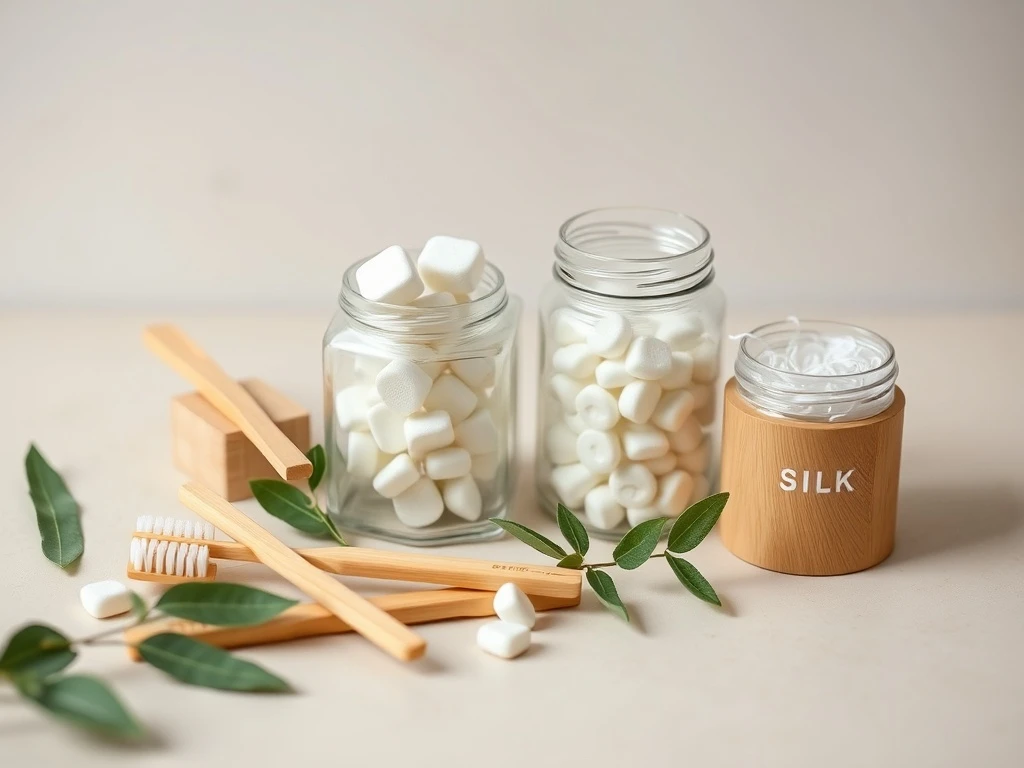In a world increasingly aware of its environmental footprint, our daily habits are under scrutiny – even something as routine as brushing our teeth. For individuals keen on smart business decisions and ethical entrepreneurship, understanding the shift towards sustainable dental care products isn’t just about personal hygiene; it’s about recognizing a burgeoning market and making choices that align with a healthier planet and a healthier wallet. Choosing eco-conscious dental products is more than a fleeting trend; it’s a deliberate move towards a more responsible consumption model, reflecting a growing consumer demand for transparency and sustainability. Traditional oral hygiene items contribute significantly to plastic waste and often contain ingredients that are neither biodegradable nor ethically sourced. By making mindful investments in sustainable dental care products, consumers support environmental responsibility without compromising their oral health. This article explores how to navigate this evolving landscape, ensuring your choices are both effective and eco-friendly.
The Hidden Cost of Traditional Oral Care: Why Sustainable Dental Care Products Are Essential
Have you ever considered the journey of your toothbrush after it leaves your bathroom? The impact of conventional dental products on our environment is startling. Each year, an estimated 1 billion plastic toothbrushes are discarded in the United States alone, generating over 50 million pounds of waste. Most of these toothbrushes are non-recyclable and end up in landfills or oceans, where they persist for hundreds of years. This single item represents a massive contribution to global plastic pollution.
Beyond toothbrushes, conventional toothpaste tubes, floss containers, and various plastic packaging components further exacerbate the crisis. Many mainstream products are manufactured using fossil fuels and packaged in multilayer materials that are nearly impossible to recycle through standard curbside programs. These designs prioritize durability over environmental impact, making eco-friendly disposal a significant challenge. The cumulative effect of these daily choices leads to:
- Massive Plastic Accumulation: Contributing to overflowing landfills and ocean plastic gyres.
- Resource Depletion: Reliance on non-renewable fossil fuels for manufacturing.
- Chemical Leaching: Potential for harmful chemicals from plastics to enter ecosystems.
- Long-Term Persistence: Materials designed to last for centuries, creating a lasting legacy of waste.
Switching to sustainable dental care products can curb this destructive trend, but only if consumers are aware of the long-term environmental costs of their current choices and understand the powerful impact of their purchasing power.
Evaluating Eco-Friendly Toothpaste: Your First Step Towards Sustainable Dental Care Products
When considering a shift to green dental care, toothpaste offers one of the easiest and most impactful changes. The market now boasts countless toothpaste options that use recyclable tubes, glass jars, or aluminum packaging, proving that sustainability can begin with the swipe of a toothbrush. These alternatives often replace synthetic ingredients with naturally derived components such as baking soda, coconut oil, or xylitol.
However, the terms “natural” or “green” are not always regulated, making scrutiny essential. To ensure you’re truly investing in sustainable dental care products, look for:
- Third-Party Certifications: Organizations like the Environmental Working Group (EWG) or USDA Organic offer assurances of transparency and ethical production.
- Transparent Ingredient Lists: Understand what you’re putting into your mouth and down the drain.
- Innovative Packaging: Options that come in tablet form or powder significantly reduce water use during production and eliminate the need for plastic altogether.
While prices can vary, investing in toothpaste with minimal packaging and non-toxic ingredients offers long-term health and ecological benefits, aligning your oral hygiene with your values.
Choosing the Right Toothbrush: A Foundation of Sustainable Dental Care Products
Plastic toothbrushes may be inexpensive upfront, but their environmental cost is high. Transitioning to bamboo toothbrushes offers a biodegradable alternative that maintains durability while drastically cutting down on waste. Bamboo, a fast-growing and naturally antimicrobial plant, is a highly sustainable material that requires no pesticides or fertilizers to thrive. Many brands even offer detachable heads, further reducing waste by allowing users to replace only the bristle section.
For those who prefer electric toothbrushes, there are also more sustainable options. Look for models with replaceable heads and rechargeable batteries. While the initial investment may be higher, the long-term value – both financially and ecologically – is worth considering, as these units are built to last several years. Making this choice is a significant step in embracing sustainable dental care products.
Floss and Mouthwash: Completing Your Sustainable Dental Care Products Arsenal
Traditional floss, typically made from nylon or Teflon, often comes in non-recyclable plastic containers, contributing to the waste problem. Eco-conscious consumers now have access to biodegradable floss made from materials like silk or corn fiber, thoughtfully packaged in refillable glass containers. These options not only reduce waste but also eliminate harmful coatings like PFAS, which are linked to health issues and environmental toxicity.
Mouthwash tablets present another innovative solution. These compact alternatives eliminate the need for bulky plastic bottles and are activated with water before use. They’re typically sold in compostable or glass containers, taking up less space during transport and reducing carbon emissions associated with shipping. These seemingly small shifts, when adopted widely, multiply into meaningful environmental impact, making these vital components of your sustainable dental care products collection.
Understanding Cost vs. Value: Is Investing in Sustainable Dental Care Products Worth It?
It’s true that sustainable dental care products can sometimes carry a higher price tag upfront. However, many of these items are designed for longevity or are refillable, offering better value in the long run. Consider this comparison:
| Product Type | Traditional Cost/Value | Sustainable Cost/Value |
|---|---|---|
| Toothbrush | Low upfront, high environmental waste, frequent replacement. | Higher upfront for bamboo/electric base, biodegradable/replaceable heads, lower long-term waste. |
| Toothpaste | Low upfront, non-recyclable plastic tubes. | Similar or slightly higher upfront for tablets/jars, refillable options, zero plastic waste. |
| Floss | Low upfront, plastic container, nylon/Teflon material. | Higher upfront for glass container, biodegradable floss, refillable, no harmful coatings. |
A bamboo toothbrush may cost more than a disposable one, but when paired with a refillable toothpaste and zero-waste floss, the overall monthly spend can become surprisingly competitive. Furthermore, many sustainable products are manufactured by companies committed to ethical sourcing, fair labor practices, and carbon-neutral shipping. Supporting such businesses means contributing to broader social good beyond just environmental impact. Being cost-conscious doesn’t have to mean compromising values, especially when those values can align with better quality, longer-lasting products.
Empowering Your Purchases: How to Make Informed Decisions on Sustainable Dental Care Products
The sheer number of eco-labeled dental products can be overwhelming. To make educated decisions and truly invest in effective sustainable dental care products, it’s helpful to research brands and read reviews focused on both performance and sustainability. Look for:
- Certifications: As mentioned, EWG, Leaping Bunny (for cruelty-free), or USDA Organic offer assurances of transparency and ethical production.
- Packaging: Prioritize brands that minimize packaging altogether or use materials that are curbside recyclable, compostable, or refillable.
- Company Values: Does the brand openly share its sustainability mission, supply chain, and commitment to ethical practices?
- Subscription Models & Refill Stations: These growing trends give consumers more control over waste and the frequency of purchase, often making sustainable options more accessible and affordable.
Being informed doesn’t just help the planet—it helps avoid wasting money on greenwashed or ineffective products. Your purchasing decisions are powerful votes for the kind of world you want to live in.
Conclusion: A Brighter Smile and a Greener Planet with Sustainable Dental Care Products
The journey towards a more sustainable lifestyle is paved with small, deliberate choices, and your oral care routine is a perfect place to start. By investing wisely in sustainable dental care products, you contribute to a significant reduction in plastic waste, support ethical business practices, and often choose products with healthier, more natural ingredients. This shift is not just about personal responsibility; it’s about being a part of a larger movement towards a healthier planet and a more sustainable future. Every bamboo toothbrush, every toothpaste tablet, and every refillable floss container adds up, turning your daily habit into a powerful statement for environmental stewardship. Make the switch today, and experience the profound difference that smart, sustainable choices can make for your health, your wallet, and our world.
Frequently Asked Questions (FAQs) About Sustainable Dental Care Products
1. Why are traditional dental products harmful to the environment?
Traditional dental products, especially toothbrushes, toothpaste tubes, and floss containers, are predominantly made from non-recyclable plastics derived from fossil fuels. They contribute to massive landfill waste and ocean pollution, taking hundreds of years to decompose, releasing microplastics and potentially harmful chemicals into the environment.
2. What are some common types of sustainable dental care products?
Common sustainable alternatives include bamboo toothbrushes (biodegradable handles), toothpaste tablets or powders (eliminating plastic tubes), biodegradable floss (made from silk or corn fiber in refillable glass containers), and mouthwash tablets (reducing plastic bottle waste).
3. Are sustainable dental products more expensive?
While some sustainable dental products might have a slightly higher upfront cost, many are designed to be more durable, refillable, or last longer, offering comparable or even better value in the long run. The overall environmental and ethical benefits also add significant non-monetary value.
4. How can I verify if a dental product is truly sustainable?
Look for third-party certifications (e.g., EWG Verified, USDA Organic, Leaping Bunny for cruelty-free), transparent ingredient lists, minimal and recyclable/compostable packaging, and clear statements about the company’s commitment to ethical sourcing and environmental responsibility.
5. Do eco-friendly toothpastes contain fluoride?
Some eco-friendly toothpastes do contain fluoride, while others offer fluoride-free alternatives using natural ingredients like xylitol or nano-hydroxyapatite for remineralization. It’s important to check the ingredient list based on your personal preference and dental health needs.


















